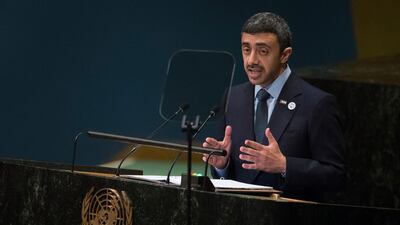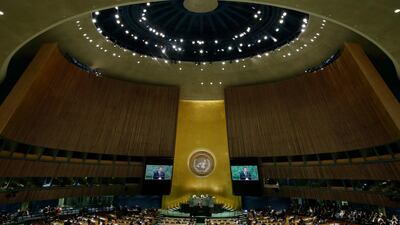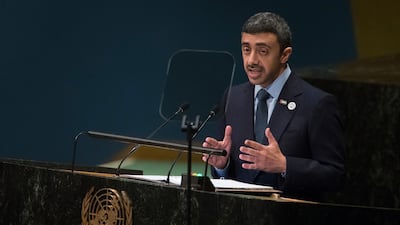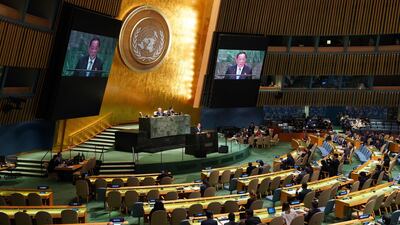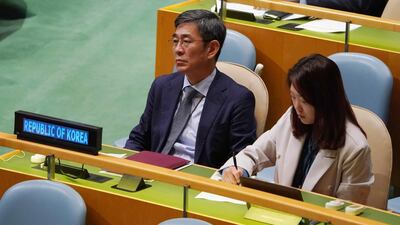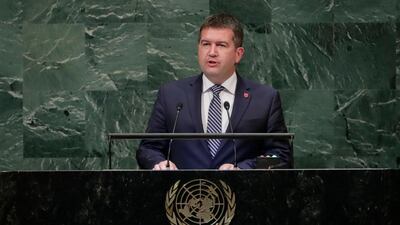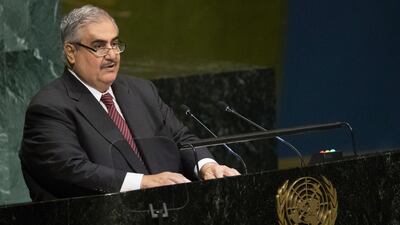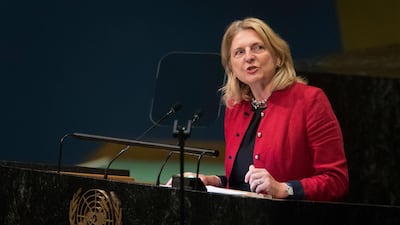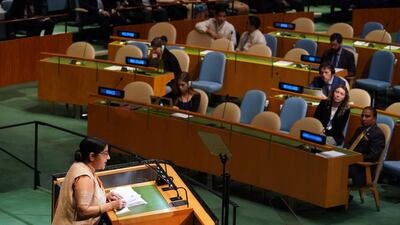The UAE Minister of Foreign Affairs and International Co-operation yesterday condemned Iran's supply of arms to the rebels in Yemen and efforts to undermine the UN mediator.
Sheikh Abdullah bin Zayed told the UN General Assembly that an "increasingly dangerous" situation had developed through the unprecedented level of Iranian aggression in the region.
“The first challenge is foreign interference in the affairs of the region and the Arab world,” Sheikh Abdullah said. “Certain countries, particularly Iran, are prone to attacking the security of the region, spreading chaos, violence and sectarianism.”
He said that in its alliance with the Houthi-led rebels, Iran had a hand in some of the worst features of the conflict, such as the spread of landmines and the recruitment of child soldiers.
Its “nefarious interference” in Yemen and attacks, as well as the Houthis’ attacks on Saudi Arabia with Iranian-supplied ballistic missiles, left the UAE with no option but to join the Arab Coalition.
“We cannot afford to remain mere spectators when these threats reached Yemen and Saudi Arabia,” Sheikh Abdullah said.
“Saudi Arabia is threatened by Iranian missiles through the Houthi militias in Yemen who are intransigent on all peace initiatives in Yemen, as evidenced by their recent absence from the recent talks in Geneva.”
Sheikh Abdullah said that UAE-led Yemen forces were engaged in an offensive to liberate the western city and port of Hodeidah from the Houthis, which would play a key role in changing the face of the conflict.
He said it would “achieve a strategic shift that would enhance the prospects of reaching a political solution”.
Sheikh Abdullah said the spread of extremism was promoted by certain states.
“We have witnessed major changes in the international order, including the rise of armed terrorist groups that rely on extremist ideologies and aim to destabilise countries,” he said.
“The situation is becoming increasingly dangerous as countries provide media platforms for hate speech.
“What is even more dangerous is the support that rogue states provide to these groups.”
Sheikh Abdullah said the boycott of Qatar by its neighbours was a “vital and decisive”.
During the week-long UN meeting, he met US and other officials about Iranian aggression, the humanitarian crisis in Yemen, and confusion over the White House plan for Palestinian statehood and plans for Mesa, the “Arab Nato”.
Sheikh Abdullah met Yemeni President Abdrabu Mansur Hadi to review the progress of the Arab Coalition against the Houthis and Al Qaeda in the Arabian Peninsula.
“This terrorist group was severely impacted after the coalition was able to degrade its forces, cut off its finances and liberate areas under its control.”
Also speaking at the UN yesterday was Sheikh Khalid bin Ahmed Al Khalifa, the Bahraini Foreign Minister, who warned about Iran’s desire to sabotage the political environment of its neighbours, particularly Iraq, and its support for terrorism.
Sheikh Khalid said Iran posed a threat to the strategically important Strait of Hormuz and Bab Al Mandeb.
__________________
Read more:
Saudi Arabia supports Donald Trump’s strategy to counter Iran, says Jubeir
Mahmoud Abbas tells UN: 'Jerusalem is not for sale'Full text of Palestinian President Mahmoud Abbas' speech at UN General Assembly
UAE minister of state for foreign affairs holds talks with US envoy for Syria
Emirates Red Crescent provides aid to Yemen's remote areas
